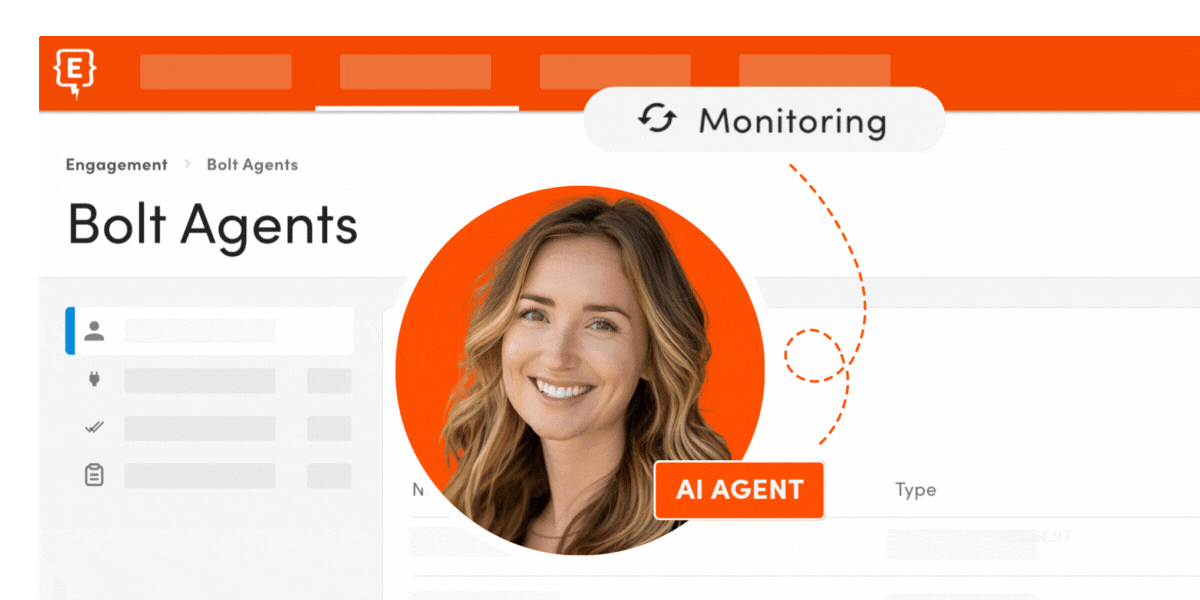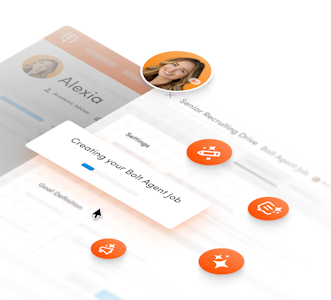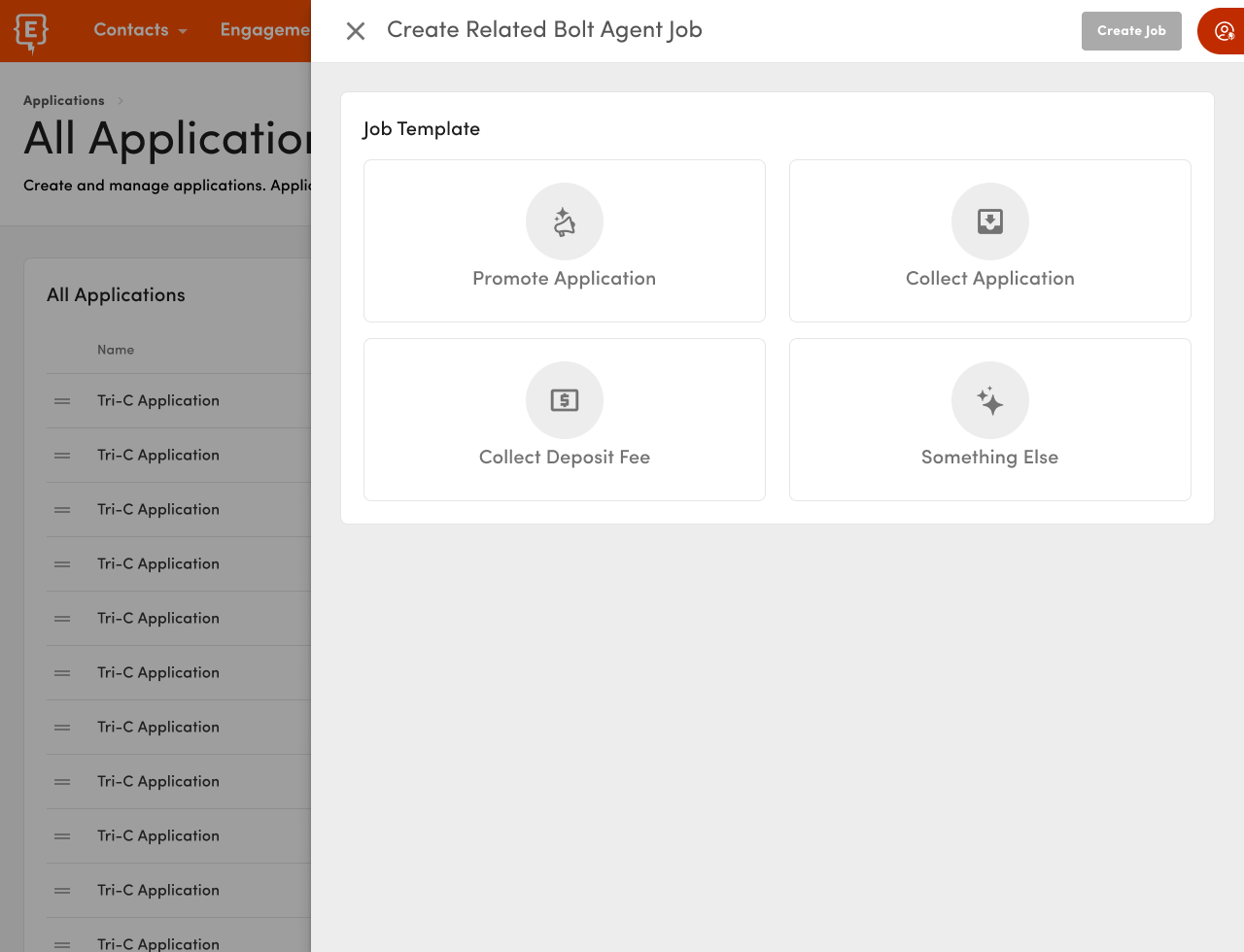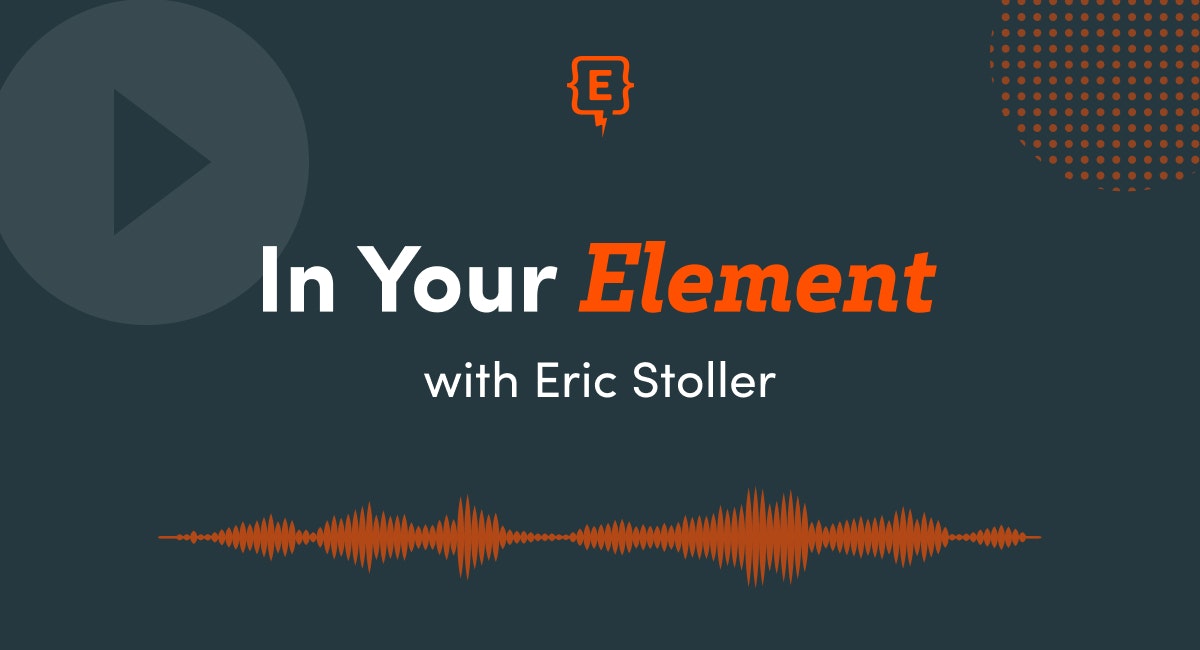Digital Connection for Gen Z: The Importance of Developing Relationships Before Stepping Foot on Campus with ZeeMee’s Vanessa Didyk
by Sirley Carballo · Nov 22, 2021
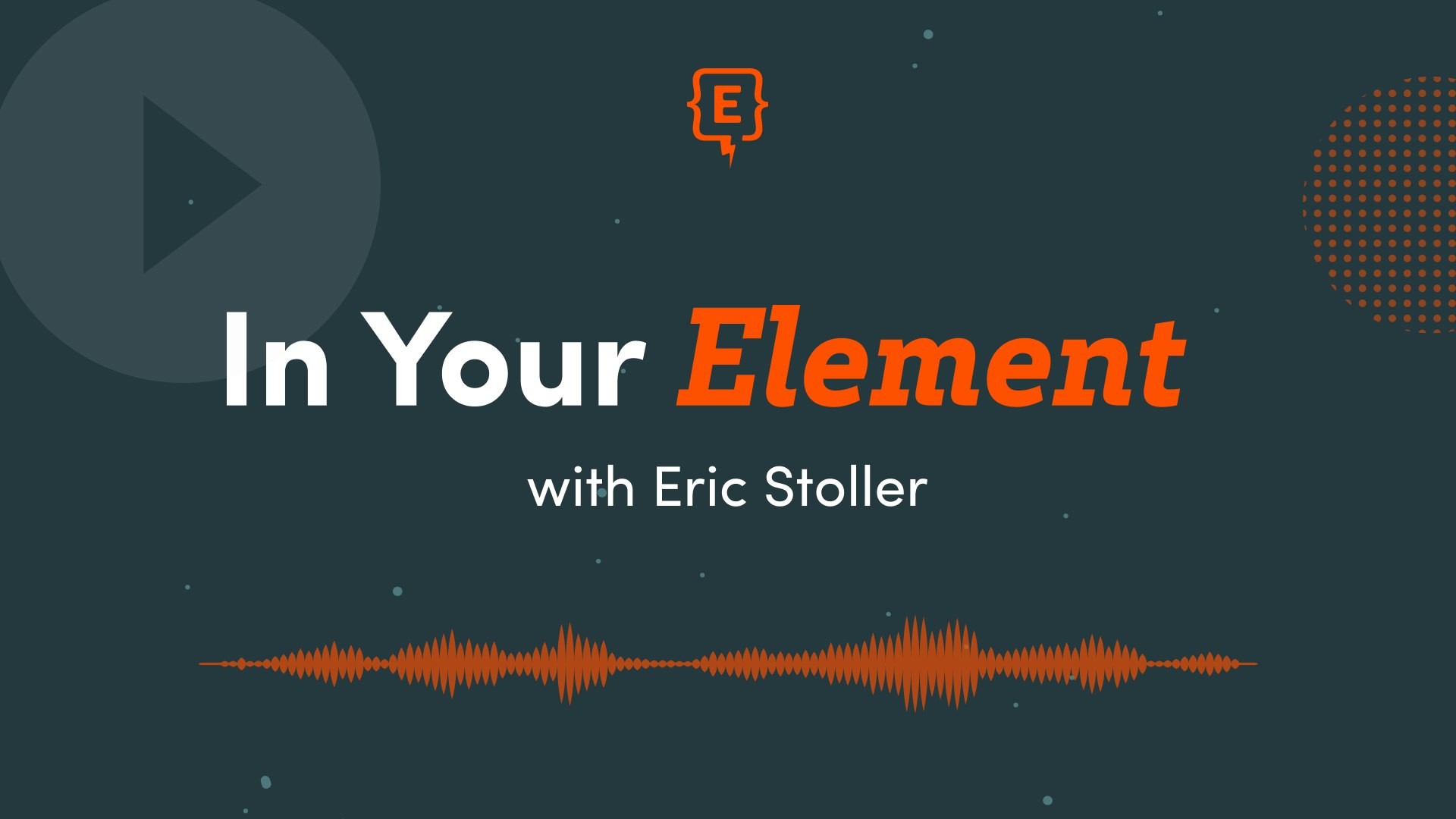
Vanessa Didyk, CEO of ZeeMee, joins Eric Stoller on Episode 6 of the In Your Element Podcast, to chat about the ZeeMee app and how the digital connection landscape has rapidly changed as more and more students report feeling lonely. Together, they discuss the importance of connection among peers and how ZeeMee helps colleges foster the kinds of relationships that are beneficial to Gen Z students. Topics covered include:
- Why students, and especially incoming or prospective students, need a space of their own to form bonds.
- How schools can use ZeeMee to quickly and seamlessly run student events
- What sort of insights schools can glean from ZeeMee’s student analytics
- What digital functionality will be standard for all students in the next two to three years?
Listen to Episode 6 of the In Your Element Podcast here.

A lot of these apps are trying to adapt for Gen Z, which is just a different generation, different population, different needs. We are building for Gen Z first, and building an experience that really works for how they experience the digital world.

Full Transcript of Episode 6
Vanessa
Those loneliness stats are just outrageous. And I think that's what we really solve. 67% of women, 54% of men in college have been very lonely in the last 12 months. 30% very lonely in the last two weeks. And that's pre-COVID those numbers. And so this is people with every social app available to them, every on campus activity and club available to them, still feeling very disconnected and lonely.
Eric
Welcome to In Your Element, a podcast on the Enrollify Podcast Network brought to you by Element451, and advanced student engagement, CRM, providing higher ed institutions with a competitive admissions advantage from recruitment to enrollment through the use of AI. On each show, we ask five questions about current challenges, exciting opportunities, and what's next in higher education. I'm your host, Eric Stoller. And on today's show, we have Vanessa Didyk, CEO of ZeeMee, an app that's in over 1,000 college communities that allows students to apply to school, decide where to go, and get ready for campus.
Vanessa
It's a social network for students who are applying to college and kind of moving on to their college campuses. And through the process of engaging in that social network students kind of find each other, find the right fit schools and figure out, you know, where they're going to go, and then develop friendships that are going to make them really successful. And then for the colleges, students that make friends stick. And so those students convert at higher rates through the recruitment funnel, and then they persist at higher rates once they get to campus. So it's a pretty simple calculation where both sides of this ecosystem win.
Eric
That engagement in the higher ed ecosystem has become even more critical in the age of COVID where in person events might not be what they used to be. We'll get into that in a moment. For Vanessa, her journey to being a CEO of a tech company in the higher ed space, was pretty much what she was born to do.
Vanessa
Well, I grew up in a household with a dad who's an entrepreneur, and a mom who's a college professor. And I think that combination made me an entrepreneur interested in education. And so right after college, I started a company and I have had a passion for helping students and helping people level up in their lives. And everything that I've done since has been pulling on that thread a bit.
Eric
Nice. Well, it seems like you're continuing to pull on that thread. And ZeeMee being a major peer-to-peer application, it's almost as if you've taken the principles of student engagement or student development, with the more engaged students are, the more likely they are to be successful when you've positioned it prior to them setting foot on campus.
Vanessa
Yeah, exactly. It's really critical point. 89% of students today want to know who their close friends, not just friends, who their close friends are before they get to school. And there's not a lot of great platforms to do that. Schools have kind of always known that that's a really powerful process, getting to meet other students. That's why they have Admitted Student days and on campus orientations. And they host events, you know, for local students to meet each other before they get to campus. And we basically just blow that up and help schools do that. And students do that at scale.
Eric
You've seen a huge increase then during the pandemic, because like you said, those events that are historically held, those are a lot those are in person, usually, right? That's a welcome week event on campus, rec sports stuff going on, people are showing movies and whatnot. Now what?
Vanessa
Yeah, absolutely, we saw the schools turn to ZeeMee a lot more. Because we added a virtual event solution, we started running a bunch of really fun, social events and helping schools run social events. That was a piece that was really missing. Schools are starting to figure out how to do chats with financial aid, or do a fireside chat with our president. But they weren't really figuring out how to connect students. And so that's where we came in. And we started doing speed friending events, and trivia nights and scavenger hunts, and all of that fun stuff. And that was really powerful for students to get to know each other and for them to feel like the schools actually cared about the community building and in helping to build those important connections.
Eric
So they're just doing those events then on their phone.
Vanessa
Yes, it's all on their phone. And they don't have to really remember. They get a push notification that says, "Going live in 15 minutes, we're going to be doing speed friending. Don't miss it." And so it's really easy. They just open their phone, log in, join the event, make some friends in like half an hour, and then go back about their day.
Eric
So how do do students find out about ZeeMee though, right, because it's an app.
Vanessa
It's an app you you download. They find out about it from the schools. We've got 123 active college communities because it's led by students. So students will come in, follow schools that they're interested in, get to know each other, and start to form those critical connections for their futures. Schools want to participate in that and can partner with us to kind of get in on the action. And so that's where 123 schools are actually officially partnered. And they invite their prospects in and their students and then help to kind of get them going in the app.
Eric
Okay, amazing. So there's there's a bit of promotion and heavy lifting in terms of the school side.
Vanessa
Yeah, we help the schools do that as well. So we'll help send out those invites. And then there's a lot of organic traffic. We saw a huge increase in students just finding us organically through peers and through invites and share profiles and stuff. We have these really rich profiles that you just can't find anywhere else today where students can find out like, what somebody Harry Potter house or which three emojis that define them. And "do they prefer cake or pie", random things that help start conversations, but you just don't have that access and those kinds of conversation starters anywhere else.
Eric
So kind of the informal aspects of life that cake or pie, not the biggest monumental thing.
Vanessa
There's also deep ones. But yeah, the things that start the conversations. Gen Z is is riddled with anxiety, and is supposedly a more anxious generation than any generation prior, desperate to make connections, desperate to sort of solve this loneliness epidemic that we're seeing. And yet there's a lot of these apps that are out there today, make it hard to reach out, there's that sort of fear of rejection that we really break down and make it really easy to make new friends and sort of normalize meeting.
Eric
What do you what do you think that is, though? I mean, I was thinking when you were saying, like the Harry Potter houses and other sort of apps? Yes, I was thinking that, to me sounds very similar to when I joined Facebook back in 2004 when dinosaurs roamed the earth.
Vanessa
Yeah. Yeah, you're not wrong, we see that too. We think that Gen Z is allergic to Facebook, right? Because moms on Facebook, grandmas on Facebook. So there is a big hole to fill and to build. I think a lot of these apps are trying to adapt for Gen Z, which is just a different generation, different population, different needs. We are building for Gen Z first and building tools and an experience that really works for how they experience the digital world.
Eric
Well, so here's an actual official question from the lists. That's the theme of this show, as we always do have questions, but then after that derailment occurs usually fairly quickly. And I was thinking this as you've even been mentioning, Gen Z. But how do you foster student engagement across a wide range of demographics, cohort experiences, because as institutions expand their offerings, even those for four year, traditionally, under sort of serving undergraduates, student institutions, they're looking beyond that now. And also what is even a traditional student these days?
Vanessa
What sort of bonds everybody and unites everybody is this common shared experience of going through this particular moment in the academic journey, regardless of what else is going on in their lives, their backgrounds, all of that, and then we help to connect it these students and these users in smaller groups as well, so you can connect, we have a black student forum, we have an animated chat, we have the ability to kind of help people find friendsacross all of these different sort of superficial barriers. It's almost like student organizations before you set foot on campus, you can almost start to have those emerge ahead of time. And whenever you want to talk to somebody, if you're up at 11:30 at night, and you're feeling a little bit lonely, or you're feeling like you need to connect, you're feeling anxious about heading to school, or you're at school, and you're feeling anxious about making some more friends, there's always somebody in ZeeMee to talk to and to connect with. And there's something really powerful about that. And I think that the other piece is that all the people in ZeeMee, it's a little bit different than other social media. Everybody who's there is looking to connect and make new friends. It's not just about like putting your highlight reel out there, or collecting as many followers or as many likes as possible. It's about being your authentic self, and connecting with people sort of in real time in the moment and developing meaningful friendships.
Eric
That's how it's kind of different than those class of 2022 Facebook groups that have kind of become almost passe, or cliche. I guess nowadays, they don't necessarily have the same traction like they used to. And this seems to be like that natural evolution of that, sort of speaking of the evolution of higher ed, coming out of a pandemic. I'd like to be post post post pandemic, but what's the biggest challenge facing higher ed today that you see?
Vanessa
I think students have all these different ways to access education now and to carve different types of paths. I mean, we hire engineers, and I don't care if you have a college degree or not, when I'm looking to hire you, I care about your skill set. And so I think that this generation is very ROI oriented, they have a lot of opportunities available to them, they have different online opportunities. Now, particularly after the pandemic, there's faster access to learning on your phone. You can watch YouTube videos to learn things, you can get direct access to professors now, who now are streaming their own YouTube channels. So I think that staying kind of current, relevant, top of mind and showing sort of the bigger value of the education, that the top top schools, those brands will live forever. But for everybody else, I think, to really stay relevant and show the value that students get from this college experience, I think that's going to be continue to be a big a big challenge as boot camps and all of these other things come up. I think Purdue, with their income share agreement is staying really current. There's some really interesting innovation happened.
Eric
Yeah, no, definitely. And it makes me think, you mentioned boot camps, and I think about OPMs. And just some of the other workforce development microcredentials. The people that are going through those those types of educational experiences, they're not going to be your typical ZeeMee peer to peer user necessarily, because they've got friends already, maybe they've got life obligations, what have you, but they still need that sort of stickiness to stay connected to the campus, or to the online environment.
Vanessa
They all need to be in ZeeMee. So for us, all of them are targets. Because the universal experiences that student experience, the need the need for connection. Students who have peers that they feel connected to succeed. They do better, they stay more focused, they are able to persist they just do better. And so that's in any program, Boot Camps get really hard and really challenging and very, very stressful. And to have a peer community that you can lean on is very important. Those boot camps need to recruit, there's a lot of boot camps out there. And so those boot camps need to differentiate themselves by building community. I think that's one of the things that is so special about traditional higher ed, is that community is those relationships you develop, those are the people who are going to be at your wedding and godparents to your children. And so there's a lot of really significant growth and development that happens during that time.
Eric
Yeah, no doubt. I mean, I work for Element451, we're a student engagement CRM. And so I'm very interested in sort of the the signals that ZeeMee is sending out and what kind of data are you sending out that our CRM could utilize within other campaigns? Because obviously, when you when students set foot on a campus, I mean, they're meeting face to face so, one, do they use ZeeMee as much? And then two, how does all that data get output in a way that it can still be beneficial for people as they go down their their journey throughout the student lifecycle and to even being alumni. You know, things like fundraising and advancement stuff?
Vanessa
Yeah, we help schools to understand how the tides are turning on kind of a macro level. So to understand what the students care about, how they're moving through, particularly the recruitment process. And then we also help them to kind of drill in for marketing purposes and understand, okay, this student was really engaged with you guys, and seems to be drifting. So this is probably a student that you want to reach out to or send some, you know, marketing messaging to or, there's some kind of particular signals that we can give. We also have a score that we assigned to each student—how likely is that student to actually enroll. So there's a lot that we know. We're very careful, though, to protect student privacy. And so there's a balance there. So we give the schools tools that they can use to sort of make smarter decisions, and be more proactive and strategic with that marketing. And then we also make sure that we're helping the students.
Eric
Now, you said Facebook has your mom and your grandmother. I mean, isn't that a similar scenario then if staff are in those places?
Vanessa
So the students have their own spaces as well, so they have their own their own space, but then we have designated spaces where they expect to engage with the admissions folks.
Eric
Do they actually show up to those types of engagements as much as they do with the peer to peer stuff?
Vanessa
Yeah, I think the peer to peer is way more powerful, frankly. Like we have colleges that don't do anything in the app. They sign on, they get their students and they just don't have the bandwidth to really do much. And yet, their yield lift is outrageous. And it's just absolutely fantastic. It's really because of the power of that peer to peer engagement. Those students are finding each other and they're getting to know each other. We tell our counselors to just stay out of it as much as possible, invite students into the live events, be available for them when they asked you questions in the Ask the Counselor chats or the Ask a Current Student chats, but then stay out of the rest of it, because that's not the space for you. This is a space for that, and it's a space created for them. And they can create their own private chats and nobody looks at private chats. So it's a nice like balance. I think this the students see value that the schools are there and it also elevates a lot of the conversation. So we don't see trolling or you know, kind of negative behavior, like you might see in other social platforms. And I think part of that is just because students are kind of bringing their best selves forward.
Eric
I was thinking about a friend of mine, Todd Sanders, I think he just finished up his role as the Head of Social Media for the University of Florida. And he was one of the sort of early adopters of using you know, Tik Tok, for example, for student engagement. There was a bit of criticism early on for using it but you look at their account now at the University of Florida and it has a whole bunch of interactions and engagement through it. It's been really popular with students. How do you compete with with sort of the up and coming big names in that space. How do you compete like that?
Vanessa
Yeah, we're a focused space. So that's a very noisy space and every school should be there. They should be on Tik Tok, they should be on Instagram, they should figure out how to do that. They should pull that content in to ZeeMee and drop it on into our feeds as well. But this is a focused space. This is where students come not to just engage with a million brands and all their best friends. This is a space to come to engage around the college journey and, it's so focused on that. All of the features we have are oriented around that. You can filter and find people in these really creative, clever ways. So you can go into our app and you can say like, "Hey, I'm applying to UC Berkeley, show me everybody applying to UC Berkeley, graduating 2026, interested in rock climbing, who also wants to major in English" and so like you just can't get that anywhere else. So the schools should be here because we have created something that students literally can't get anywhere else. We have our our students are opening the app seven times a day, which is fantastic. Our three month retention is better than Instagram, it's better than Snapchat, and it's better than Twitter. So we've built something that students really want to use and there's a massive hole right now that that needs to be filled. It's fantastic that colleges can come and participate in the space and draw immense value. We just ran a sub analysis and our average ROI for our pro-partners is 2.7 million so that that's their return.
Eric
That is what? Only about a million less than what you cost
Vanessa
Yeah, they're paying us for our pro package, $35,000 and that return is $2.7 million. That's just insane. We're really open with our prices, our return, our student usage. We're very metrics driven ourselves. We think colleges should be as well.
Eric
So are there other dashboards then that administrators can go in and look at or is that just on the phone? Or is it on the desktop?
Vanessa
Yeah, it's desktop. It's a really slick dashboard and we think of ourselves as almost like the mixpanel of college admissions. We give you the macro, the micro, drill in. You can see all of these charts, compare year over year, compare your growth, map it directly to dollars, and there's a lot there. It's a really, really rich dashboard. Probably more stuff than anybody needs on their mix.
Eric
Wow. I mean, outside of the edtech world, maybe we'll see if that'll have legs, but you mentioned events. I know Zoom became kind of the predominant platform for events when admissions counselors can't go on the road and do their thing. And I know PlatformQ has been doing some amazing stuff around really curated and engaging events, but what are events like with ZeeMee?
Vanessa
Social, it's super, super social. It is so fun. They're super easy to plan. We built some tools to make it really easy to run these social events. We've got trivia banks so you can run trivia nights, we had Elon runs these events called like User Your Melon.
Eric
I thought you were gonna say that Elon Musk or something, I was like "what?"
Vanessa
These events are so much fun. They're short, they're social. We also can do a chat with a student panel, financial aid, or chat with somebody in admissions, as well as Q and A's, but the ones that are just like fire, and have really high attendance are the social events because the schools can run them. Without much planning, they can tell all the students to drop in. And then they just start putting like these fun icebreaker questions and students start answering and then they'll all start DMing each other and starting their own little threads about something that they connected on, because the students are desperate to connect with each other. And we're just solving that and they're desperate to connect as early as inquiries. It's not just in the admitted phase, it's early, early, early, they want to know who are you? Are you my people? I could use your support through this process. Let's get to know each other and figure out if we should be friends. And this is where we should both be going. And then once those friendships are made, the students stick. They're much more likely to keep converting through that funnel.
Eric
Now do people keep using ZeeMee like after they step up foot on campus? Or do they kind of say okay, I'm with my pals now. Thanks for the lift, ZeeMee.
Vanessa
Yeah, it's a good question. So they do, they do keep using it. We are seeing students using it longer and longer. So this year are all of our chats heading onto campus are still just like insanely active, firing like crazy, the DMS are really active, there's a lot of activity. We're releasing our study buddy feature next week, so that students can actually search and find who else is in their same classes. We've got dorm chats so we've got a lot going for them. And we're continuing to release more features. Our goal is to serve them all the way through as alumni, but they're staying longer and longer on the platform because it's it just stays relevant. And those loneliness stats are just outrageous. And I think that's what we really solve, you know, 67% of women, 54% of men in college have been very lonely in the last 12 months. 30% very lonely in the last two weeks. And that's pre-COVID, those numbers.
Eric
Oh, really? I was thinking those were during pandemic because everybody's home.
Vanessa
No, these are pre-pandemic numbers. And so this is people with every social app available to them every on campus activity and club available to them, still feeling very disconnected and lonely and 52% of our users have found what they consider close friends in ZeeMee. That's what we solve. It has massive dollar impact for colleges to help students build these connections, but it has massive health and wellness benefits for students.
Eric
Yeah, well, if the last year and a half is showing us anything is that your mental health and wellness, those are top of mind for for everyone. And obviously, I already have a couple more questions here before we wrap up. What do you see as the future of student engagement, big picture.
Vanessa
I think every school needs to engage students early, early, early, long before they even apply. They need to engage them all the way through and really give students a sense that the school cares about them. I think that's what we saw in this last year. And I think why ZeeMee is so successful for schools and for students was that we are reading these social events, which some people might just kind of brush off and be like, well, I don't have time to plan a social event, I just have to make sure that I get my financial aid check planned, and you know that that event is planned. And I think what we saw was that students really respond when they feel like a school is taking care of their whole self and making sure that they have sort of the connections to the school and to their peers that are going to be make them successful. And so I think the future of student engagement is starting as early as possible and engaging as long as possible, even as alumni. We've got alumni who were really stranded up there in this last year, turning back to their school saying "I lost my job or I'm not comfortable with my job because of the pandemic. I need help." I think that is is a responsibility that schools have. It's also a differentiator that schools have over some of those other things that we were talking about. Schools really do have an opportunity to take care of the whole student, you can start when they're juniors in high school, and you can support them all the way you know, through their you know, fifth job or sixth job.
Eric
Okay, so last question. This is the bonus question. I know you're like why? He's asked me like 18 questions already. That's the nature of the show. But so you know, you're a digital company, right? And it's kind of your background as well. And you've seen a lot of different things in terms of edtech. What digital functionality do you think will be standard for all students in the next two to three years? Just baseline stuff, like it's gonna be like table stakes, you gotta have it.
Vanessa
Well, ZeeMee.
Eric
That's a platform.
Vanessa
I think what we do, and the way that we connect people socially, I think is something that everybody is going to need and want.
Eric
You basically just said, "hello to my competitors. This is table stakes, you better get there."
Vanessa
You better get there. I think so. I mean, I don't want them all creeping on us, because I think we figured out something special. But I do think it's table stakes. But no, I think one of the really interesting things that we saw come out of pandemic, and especially globally, we tend to think just about our sort of domestic higher ed system. But I think globally, we are seeing with a lot more remote education, that everybody needs to figure out how to get that education into the palm of a student's hand. And I think that that's where we're going. I think there's a lot of really interesting innovation happening around that right now. And I think we saw a lot of students left behind globally, because they didn't have at home strong Wi Fi, or the computer setups or whatever, to continue learning. And what they needed was to be able to access that education through their phone, because because there's a lot more phones out there than there are desktop computers. So I think that's something that even our US higher ed institutions should really help get that education into somebody's back pocket all the time. And make that experience a lot richer.
Eric
By the way, this question totally out of order. The bonus is always the last one. But I was just thinking international students abroad, I want to connect, can I get on ZeeMee? Can I use this? Can I interact with peers?
Vanessa
Yes, you should. And we have chats for international students. And we have chats for international students at each of the schools. And some of the schools really do that well and build community for those students very, very well.
Eric
Well, the CRM person in me is thinking there's some real amazing potential there in terms of messaging and output and campaigns and just the data that you can get. Tons of insights for making decisions and knowing kind of what's going to happen. I mean, obviously be able to track prospective international students, it would be a huge win for an institution.
Vanessa
Yeah, we have we have data in ZeeMee that you literally cannot get anywhere else. And so the more students that schools can get into ZeeMee the more insights they get, andthere just is no other source for that information.
Eric
Wow. Well, then, that's pretty impressive stat. Vanessa Didyk, thank you so much for coming on In Your Element. I appreciate you taking the time.
Vanessa
Thanks for having me.
Eric
That was Vanessa Didyk, CEO of ZeeMee, which you can find at zeemee.com. Thank you for listening to In Your Element brought to you by Element451, part of the Enrollify Podcast Network. You can find more about the Element451 student engagement CRM at Element451.com. If you liked what you heard today, please give us a rating and review and follow along on Apple Podcasts, Spotify, or wherever you get your podcasts. I'm Eric Stoller and we'll see you next time on In Your Element.
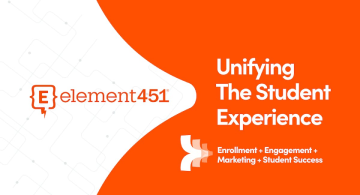
About Element451
Boost enrollment, improve engagement, and support students with an AI-driven CRM and agent platform built for higher ed. Element451 makes personalization scalable and success repeatable.
Categories
New Blog Posts
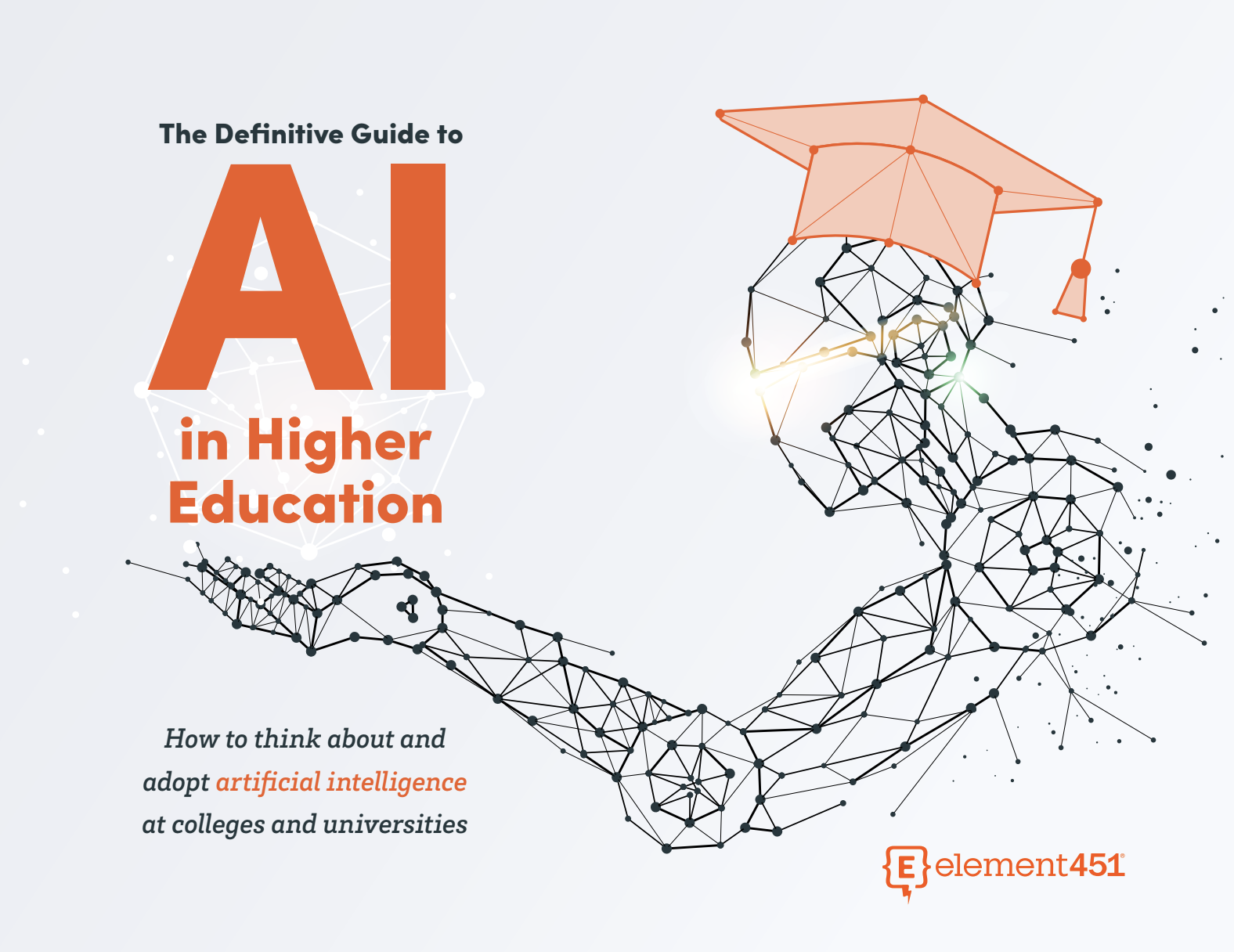
The Definitive Guide
AI in Higher Education
Bridge the gap between the latest tech advancements and your institution's success.
Useful Links
Related Articles

Talk With Us
Element451 is an AI-driven CRM and AI agent platform for higher education. Our friendly experts are here to help you explore how Element451 can improve outcomes for your school and students.
Get a Demo


